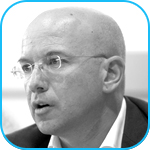This website uses cookies so that we can provide you with the best user experience possible. Cookie information is stored in your browser and performs functions such as recognising you when you return to our website and helping our team to understand which sections of the website you find most interesting and useful.
 We were honoured to interview Yves Daccord, Director General of the International Committee of the Red Cross, which carries out critical humanitarian support for people affected by armed conflict and natural disaster. In this first part of the interview, Monsieur Daccord shares his views on the ICRC’s role in the world and why people should consider working for this organisation, the ICRC’s culture and what it takes to succeed in an organisation which undertakes such challenging work.
We were honoured to interview Yves Daccord, Director General of the International Committee of the Red Cross, which carries out critical humanitarian support for people affected by armed conflict and natural disaster. In this first part of the interview, Monsieur Daccord shares his views on the ICRC’s role in the world and why people should consider working for this organisation, the ICRC’s culture and what it takes to succeed in an organisation which undertakes such challenging work.
How would you describe the role of the ICRC in the world?
The ICRC as an organization needs to have the ambition of protecting and assisting people affected by war and major humanitarian crisis and other situations of violence. We provide them with an impartial and professional response, wherever they are, regardless of the level of violence.
Why should someone come to work for the ICRC?
It starts with the fact that we have had the same vital mission for over 150 years – to work in the most extreme situations around the world to try to protect and assist people.
It’s also about working for an organization that is recognized for helping people. To do this, you will have to show leadership and address complex challenges. The people we are helping expect and deserve the highest standards possible. We also have to show a high degree of flexibility to be able to operate in today’s complex world. We are not a think tank – we are learning every day because we have to adapt. For example, we use social media a lot because the people with whom we need to engage such as the Taliban use social media.
Also, you will be welcomed for the skills you bring – we adapt our work depending on the specific needs of the people we are helping and take an holistic approach. This requires a very diverse skillbase.
The quality of your skills and experience is critical, but, equally important is your human skills. At the end of the day, your success could be dependent on what happens when you sit down to negotiate – whether it’s government officials or combatants. If you can establish a relationship of trust, you can achieve miracles – to save children and adults’ lives.
We ask a lot of our people, but we also place great importance on caring for them.
How would you describe the culture at the ICRC?
It’s a culture of doing, reflection and action. The reflection is needed to try to understand the environments in which we operate – we have to constantly challenge assumptions in order to find the most effective and pragmatic way forward. It is also important because of the responsibility we feel and show for the people we are helping and for our colleagues. The action comes from our front line role – we work with partners, but our focus is on get things done ourselves. This is why we need a large scale organization – more than 13,000 people.
We also have a team culture with a balance between pride and humility. We are proud of being part of the Red Cross and know that we have the capacity to do a lot, but we are following in the footsteps of others and we are in their debt.
